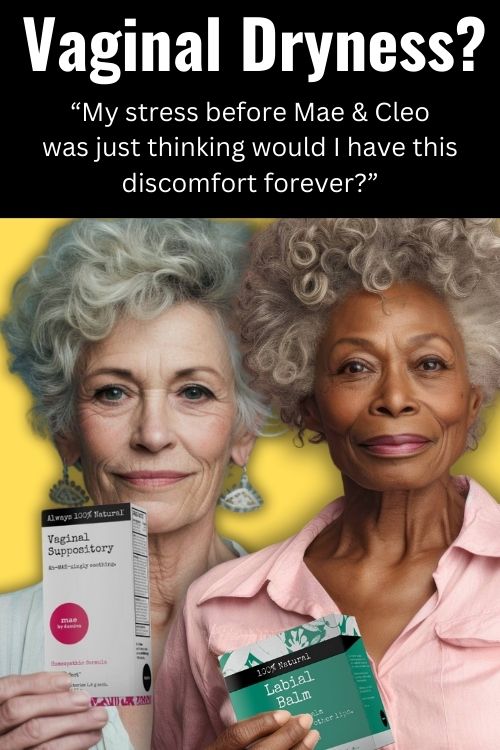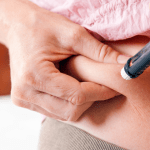- Have you been counseled by your doctor that you don’t need HRT?
- What about BHRT?
- Has your doctor frightened you from taking any hormones saying they can increase your risk of certain cancers?
- Are you at a higher risk for breast cancer?
- These are common, important questions a lot of women have about menopause.
In this video, I’ll try to shed some light on hormones and cancer. What are the risks? Are you at a higher risk or are you protected from certain diseases?
Hi ladies, welcome to my channel. This is part two of women have been misled in menopause.
And I will address some important questions many women like yourself have.
Are bio identical hormones or body identical hormones garbage, as per your gynecologist?
Breast cancer goes up after five years of hormone use, so you should stop it, right?
Or you can’t take hormones if you have a higher risk of breast cancer based on family history, right?
Or, my doctor said I can’t take hormones because I went through menopause more than 5 years ago or more than 10 years ago.
Is this true?
And there’s a lot of different varieties of that particular question.
In part one, I addressed the so called 10 year window. The idea is that we want to start on estrogen within the first 10 years of menopause, if possible. However, this does not mean, and your doctor should not think that it means, that you cannot take hormones if you started menopause more than 10 years ago.
So here’s a short recap. If you’re approaching your 60s and went through menopause when you were, let’s say 48, and so you’ve been 12 years outside of menopause and you’ve been told you cannot take estrogen, your particular health situation needs to be evaluated.
So, for example, if you have no health issues and are fairly conscious of what you eat, and you exercise, and try to get good sleep, and you keep your stress at bay, there’s no reason why you cannot take transdermal estrogen or a patch and especially bioidentical hormones, which are identical to the ones your own body produces.
So you may have protection from deteriorating further – bones, brain, heart, et cetera, as you age. Please see some of my other videos and even the jingle on the protective benefits of hormones.
However, if you are overweight, let’s say 250 pounds, you’re a smoker and you have stents in your heart because you’ve had a heart attack, there may be plaque in your arteries.
Here, there is some evidence that it’s maybe not a good idea to take estrogen in that particular situation. Keep in mind, that evidence all comes from taking estrogen orally or by mouth.
So we don’t really know. if there’s any increase in any of those risks if we use it transdermally. And most probably there is not, because we know that transdermal estrogen does not increase the risk of blood clotting.
And in that situation, there needs to be a conversation between the patient who’s overweight and their doctor about HRT and together a decision needs to be made not to take estrogen
and maybe to try something else like progesterone or testosterone depending on the symptoms experienced by that individual and definitely some lifestyle and health changes and perhaps maybe natural remedies could be an option.
So it’s never a hard no, it’s more a look at your own particular situation.
So if you are 65 or older, or have gone through menopause, you want to make sure that you’ve got good heart health.
You want to look at your lipid panel, maybe see a cardiologist and make sure that you don’t have an existing heart disease that’s being missed.
These things are individual to each person. So it’s really, doesn’t make any sense to say that every single person who has been through menopause for 10 years or more should not take estrogen.
It is just that there’s no way that could be true because humans are all different. And in fact, that data came from that really old study.
That’s not really relevant.
So one thing to remember in that woman’s health initiative study, women who started estrogen over 60 had an increased risk of blood clotting, well, minimal blood clotting, heart disease, stroke, possibly had an increased risk of Alzheimer’s as well, but that was so complicated and confused with other data that we really can’t say what the risk of Alzheimer’s is or whether there is still protection against Alzheimer’s when we started later because we haven’t studied that yet.
But certainly the safety profile is very high and the benefits can still be very great because a lot of us still have hot flashes, night sweats, vaginal dryness, and osteoporosis is just starting to get worse.
So a lot of things are getting worse when we’re in our 60s and older. So that would be a really good time to be on estrogen and it would be a really bad time to stop it.
So let’s just kind of think this through.
If we’re trying to prevent things like osteoporosis, colon cancer, which we know is decreased by estrogen, sexual dysfunction… estrogen can help with vaginal atrophy and also testosterone can also help with other dysfunction or maybe DHEA for the synthesis of both the hormones of estrogen and testosterone.
Heart disease. We know estrogen reduces heart disease unless you take it orally – by mouth.
We all know this now and the worst time to stop it would be when the risk of these diseases is going up.
So if you see your doctor and they tell you that you can’t take estrogen because you’re over 60, or you can’t start it because you’re over 60, or any combination of those statements.
Just remember, they are quoting from the Women’s Health Initiative Study.
And you need to challenge them, or find another doctor that will listen to you. The data does not apply to every patient. And more than likely, it doesn’t apply to you, and it certainly doesn’t apply to me.
So it’s critical that your doctor looks into your personal health.
They look at your history before they say no, and if somebody says no without doing that, I think the best thing to do is politely walk out of the office and find somebody else who wants to talk to you more about your individual health instead of making up those rules that are based on a very old study and evidence that is mixed up and does not make sense.
Yes, it would have been ideal if you could have started on estrogen in the first month after menopause and certainly in the first five to ten years, but it’s not true that you cannot take it just because you went through menopause ten years ago.
It just means that it requires a little bit more discussion.
So now let’s look at how long can I take my estrogen for?
Don’t I have to stop taking hormones after X number of years?
That’s another common question that many women wonder.
I was recently at my gynecologist here in Cyprus. When I asked her opinion on this particular question, her response was, Well, you’ll want to stop at some point because it’s unnatural.
So first, Bio identical hormones are identical to what your own body makes. So what could be more natural than that?
When we are deficient in a nutrient, let’s say vitamin D, we generally try to eat some foods that contain vitamin D, get some sunshine, or take a supplement. We try to build our vitamin D up in our body.
And it’s important because vitamin D has so many roles in the body. It helps older adults with osteoporosis, as it helps your body absorb calcium, one of the main building blocks of strong bones.
Then there’s the reduction of inflammation, as well as modulation of such processes as cell growth.
Neuromuscular and immune function, and even glucose metabolism.
Why should it be any different with hormones?
Which have so many functions with all the major systems in our bodies.
Estrogen has so many benefits.
Did you know, estrogen regulates your mood, mental states, cognition, and may delay memory loss.
- Estrogen deficiency can result in metabolic dysfunctions, predisposing you to obesity.
- Estrogen aids in prevention of skin aging. It prevents decline in collagen.
- Estrogen plays a role in regulating immune system response.
- Estrogen helps decrease the buildup of plaque in the coronary arteries.
- Estrogen influences the gut bacteria, I’ve got a whole video on that.
- Estrogen is protective of your kidneys, reducing hardening of the glomeruli, the tiny network of blood vessels that are cleaning units of your kidney.
I also wanted to share that a dear friend of mine here in Cyprus, she’s in her mid 80s and she’s been taking HRT, estrogen, since her 50s, for 30 plus years.
And even oral estrogen. She’s super strict on a paleo diet and she even has a great cooking book that she’s written. She exercises and enjoys life. It’s really incredible, inspiring to speak with her.
She’s vibrant, mentally sharp, healthy and fit, and her bone density is that of a 28 year old.
Recently at her 85th birthday, her husband toasted her and said, She was a fully functional woman. I think everyone was astonished. I could see a lot of jaws dropping.
And why is that? Because as women, we begin to lose our female sex hormone, estrogen, along with other hormones, testosterone, and progesterone, when we go through menopause.
And most do not feel the intense sensations and pleasure we used to.
And estrogen is needed for our vaginal tissue and to prevent atrophy and dyspareunia, which is pain with intercourse.
When I first started researching hormones and discussing with many, I remember my friend’s husband asking me if I wanted to remain a woman or become a grandma.
And it was shocking to me when he first asked me that question when I was thinking about taking hormones. But I understand why he said that now.
So the answer here to the question of how long can I take estrogen? It’s forever.
In my case, because I’m currently very healthy, knock on wood, I eat healthy.
I exercise. I do yoga. I lift weights. I try to get eight hours of sleep. Not always possible.
If I don’t, I take a nap. I stay away from sugar. In my opinion, sugar just messes up your health and hormones. It’s simply the worst.
Alcohol doesn’t agree with me, so I stay away. It exacerbates my hot flashes, so I personally stay away from it.
And hopefully, I will stay this healthy and there’s no reason to stop taking my hormone replacement.
Are bio identical or body identical hormones any good? BHRT is way out there and garbage. That’s what one doctor told my sister in law and I talked about that in my last video.

Recommended by Health Care Professionals.
Loved by thousands of women who got their life back.
Well, I take BHRT. I take a transdermal estrogen, ultragestin, and a testosterone gel and they work for me.
In my opinion, they are currently the best way of taking hormones.
I’ve not tried pellets or patches. There are other delivery methods and maybe they are good for you.
But there’s a lot of research on BHRT and its benefits. And I said they are identical to what your body produces naturally.
I’ll keep taking them for the next 50 years or whatever, the current best way to get these hormones is. Hopefully I’ll live for that many years.
It is important to get these from a reputable compounding pharmacy. Mine is in Europe. And my hormone specialist team uses this particular pharmacy for all their patients.
Mine are also prescribed to me by my hormone doctor.
Now what about breast cancer?
Breast cancer goes up after five years of hormone use. So, should you stop it?
Or, you cannot take hormones if you have a higher risk of breast cancer based on family history.
Are these statements true? If I were to get an estrogen receptive positive breast cancer myself personally, I’ll have to make a decision at that point what to do.
One option is to stop taking my estrogen for a short time while getting treated and then start back on it again once treatment is over.
Or continue taking my hormones and doing alternative therapies like oxygen therapy, fasting, alkalizing, cold plunging, and definitely mind healing.
Short of breast cancer and maybe endometrial and ovarian cancer, you can take your hormones forever.
Why would we stop them right when the risk of all of those diseases is going up?
The science does support continuing hormones for all those very reasons that I mentioned earlier.
My father died from a very aggressive form of prostate cancer that metastasized.
When initially discovered, the first medical recommendation was to cut off testosterone production.
This would potentially slow down the progression of his disease. My father went with the medical recommendation and started hormone therapy that reduced testosterone production.
We don’t know, and we’ll never know now the outcome of another route. It was his choice at the time and he was afraid.
We did alternative therapies alongside the conventional medicine.
What we did not know at the time was that there are studies that actually link low testosterone to prostate cancer.
In fact, most men who get prostate cancer are actually low in their testosterone levels. And some doctors do not agree with decreasing testosterone production.
Hormones, balanced hormones are protective and necessary to function and be healthy.
Sadly, I learned this only after my father passed away.
I think we really need to know all of our options to make an informed decision and also without fear.
So another common question, breast cancer risk goes up after five years of hormone use.
That’s a very commonly repeated sentence that doctors were taught 20 plus years ago when that infamous study was published.
The reason that they were taught that is because in the group of women who took Premarin, Prempro and Provera, the three Ps, which is not prescribed orally anymore.
After five years or more of use, there was a minuscule risk of increase in breast cancer.
And it was such a small increase that many people don’t even think that it was even what we call statistically significant, unquote.
But even if you believed this was true, the medications are not prescribed like that anymore. And it wasn’t the estrogen. It was the Provera that caused the problem.
So you don’t have to stop taking your hormones after five years or any time for that matter unless there’s a health issue that makes it very important for you to stop like having breast cancer or other female cancers and you make that decision at that time.
So what if cancer runs in your family? I’ve heard I’ve got lots of breast cancer in my family. My mother had breast cancer, my aunt, my doctor told me I can’t take hormone replacement. There’s no evidence that there is an increased risk of breast cancer for women who have a family history of breast cancer who start on estrogen.
And so that just goes back to people making up ideas that sound like they make sense based on science, but there’s really no science to support that statement.
So even if you have a gene that predisposes you to breast cancer, you have the BRCA gene. BRCA stands for breast cancer or one of the other genes that increases your risk of breast cancer.
You already have an increased risk of breast cancer, the BRCA gene predisposes you to seven times more likelihood of developing breast cancer, and I believe 30 times more likely to develop ovarian cancer. You already have that risk, if that makes sense. But there’s no evidence that taking estrogen is going to increase that risk as that risk is already there, right?
So the question is, will taking estrogen increase it further than it already exists? The answer is there’s no evidence suggesting that. In fact, if you take testosterone, it’s going to decrease your incidence of breast cancer.
So if you have a family history of breast cancer, that does not mean you cannot take hormones.
So a lot of the scientific data that has been published, as we know, has now turned out to be incorrect.
So all of the questions around timing and hormones, like how long can I take it? Do I have to stop it? Is there a certain amount of time before my breast cancer risk goes up?
All of those questions were based on the Women’s Health Initiative study using drugs we don’t use anymore, patient population that does not represent most of you, and it certainly doesn’t represent me.
If you’re still told those things by your physician, you could politely ask them where they got their information from.

Popular Read
If they tell you it was the Women’s Health Initiative study, you can politely leave and find another doctor who wants to talk to you in a more personalized manner about the latest research.
So what I think now, based in science, is starting on hormone replacement, meaning bioidentical estradiol. Not oral, but something transdermal and progesterone if you have a uterus or if you have anxiety or insomnia or lots of other symptoms that progesterone helps.
Even if you don’t have a uterus, you can take the progesterone and testosterone, if you want to improve your bone density, reduce breast cancer risk, gain some muscle, have better sex drive, etc.
There are a lot of benefits from the appropriate, very small amount of testosterone.
So all three hormones would be appropriate to start ideally immediately when you go through menopause, but certainly if possible within the first five to 10 years or more, not because it’s dangerous, but because you’re missing out on some of the protective benefits that you could otherwise receive.
So really important when you’re on hormone replacement or taking any medications whatsoever is to make sure you follow up annually or bi annually so that you check your hormone balance, your medical history to make sure nothing has changed and also ask about new developments. New things are always coming out all the time.
Is this still the best thing I should be taking?
Hormone replacement that we take now, what I’m taking now, was not available 20 years ago, and I’m sure in 20 years we’ll have something even better.
I hope this video helps to clear up some of your questions.
These are some really common ones I hear about and things that I was even interested in.
These questions are really super important.
It can just be overwhelming and a confusing time as there’s so much information and a lot of old information that gets mixed up today while new studies showing otherwise, seem to be slow in arriving at the scene.
Some countries have policies unfortunately affecting what you can even get.
Don’t give up. Be your own advocate. Trust in that.
If you like this episode, don’t forget to subscribe, share it with your friends, and I can’t wait to see you next time.









